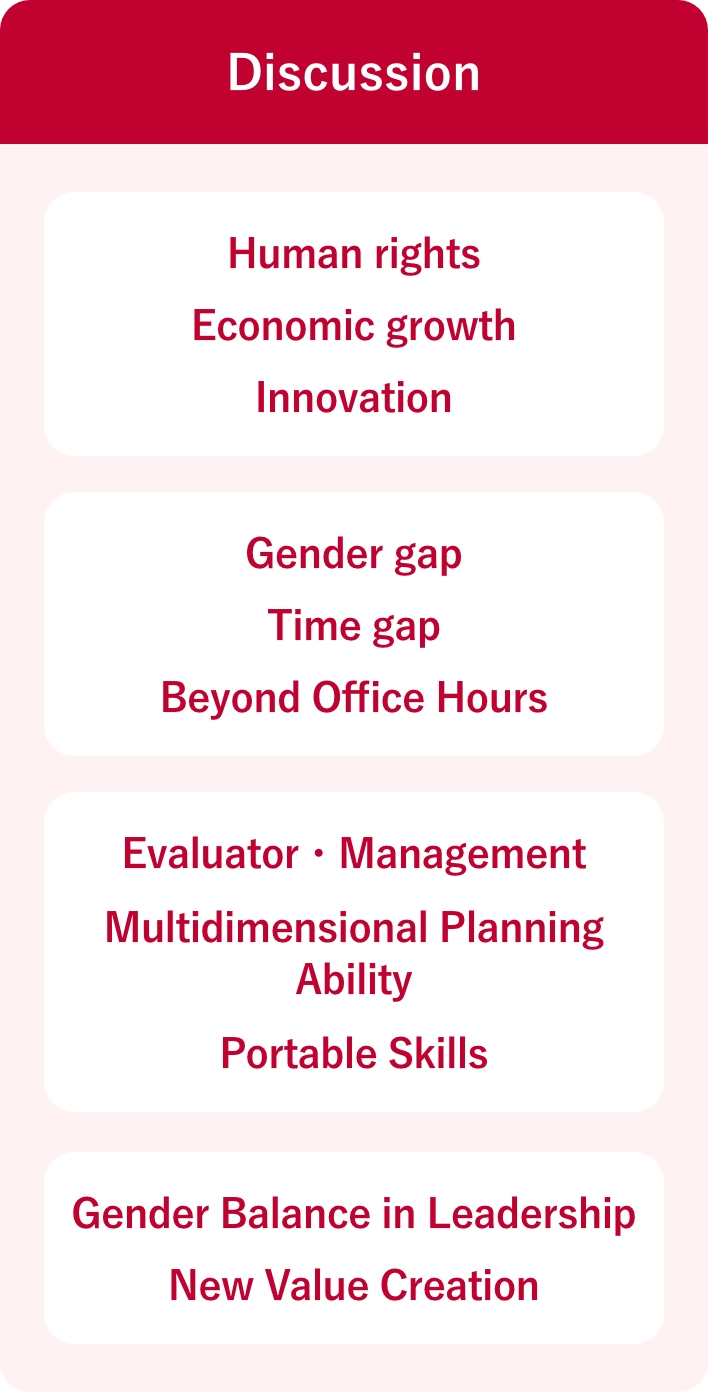In March 2025, Shiseido DE&I Lab held its first public symposium. The event aimed not only to provide insights into DE&I (Diversity, Equity, and Inclusion), including women’s empowerment, but also to offer an opportunity for multi-perspective discussions. The symposium featured an online panel discussion with three speakers from diverse backgrounds.
Speakers:
Shintaro Yamaguchi (Professor, Graduate School of Economics, University of Tokyo)
Takahiro Hayashi (Head of dentsu DEI Innovations)
Maki Yamamoto (Vice President, DE&I Strategy Acceleration Department, Shiseido)

(From left to right: Yamamoto, Yamaguchi, Hayashi)
During the event, each speaker shared insights based on their research and studies, engaging in dialogue about the barriers to advancing gender equality and the possibilities for the future, illustrated by Shiseido’s practical examples.
-
Key Messages from the Speakers
-

Yamaguchi addressed the fundamental premise that DE&I is a human rights issue, asserting that individuals should be equally respected regardless of their background. He highlighted the importance of DE&I from an economic growth perspective, citing research examples from the United States, and emphasized that leveraging the talents of individuals can be a source of innovation for companies.
He also explained the factors hindering gender equality, discussing recent research findings on wage disparities between men and women in manufacturing. The study revealed that wage gaps for women who have experienced childbirth persist even after their working hours recover, pointing to the dependency of performance evaluations on working hours, which often delays promotions for employees with time constraints early in their career. Furthermore, as a co-researcher at Shiseido DE&I Lab, he stressed the importance of openly sharing analysis results and trial-and-error efforts with internal data, as they can provide valuable insights to society and other companies.
-

Yamamoto explained that DE&I is a management strategy for Shiseido to realize its corporate mission, “BEAUTY INNOVATIONS FOR A BETTER WORLD,” and introduced several specific examples. She touched on findings from internal surveys on gender bias1, discussing the relationship between gender equality awareness, gender bias differences, and the ratio of female managers. Regarding the potential of performance management evaluation systems2, she highlighted that they not only ensure fairness but also enable employees to realize their potential and work in an authentic way. She emphasized that processes and management styles that are not bound by time are “portable skills that can be acquired later and are important beyond Shiseido.”
Additionally, she shared examples of how communication with supervisors and colleagues, such as expressing specific expectations to women during their maternity and childcare periods, can motivate them, addressing the challenge many women face with imposter syndrome.
-

During the discussion, Hayashi presented insights from the Gender Issues Chart3,4, highlighting inequalities in household chores and leisure time between genders. He metaphorically described how women, often tasked with household and childcare responsibilities, live by multiple clocks, while men typically focus on a single work-centered clock. He raised issues through specific examples from daily life. He also noted that men are more frequently ordered to transfer jobs, illustrating how societal customs affect men as well, and emphasized that gender issues are not solely women’s problems or individual concerns but challenges that everyone should address collectively.
The symposium featured discussions grounded in various research findings and practical examples, and it was notable that the term “women’s empowerment” was used sparingly. This positive aspect led to the emergence of a variety of keywords.
Towards the end, comments were made emphasizing the importance of gradually progressing towards a future where “women’s empowerment is no longer needed.”
“DE&I does not yield immediate results, but it contributes to solving various social issues. For the company’s growth in the next decade, consider it an investment rather than a cost. DE&I is not a cumbersome task; it will likely lead to individuals’ happiness.” (Yamaguchi)
“Observing the state of women’s empowerment serves as an entry point, like a health check-up, to reveal ‘where the organizational challenges lie’ and ‘what the current state is.’” (Hayashi)
“Using women’s empowerment as a trigger, the establishment of DE&I will become increasingly important for society.” (Yamamoto)
-
Editor’s Note
The post-event survey from participants of the symposium revealed numerous responses, including “a sense of conviction from data-driven examples,” “empathy with each episode,” and “surprise and anticipation toward the Shiseido DE&I Lab’s ongoing dissemination of various insights.” We extend our gratitude to all participants and hope the event provided valuable insights. As we aim to contribute to a future where the term “women’s empowerment” becomes obsolete, the DE&I Lab will continue to advance various initiatives.







